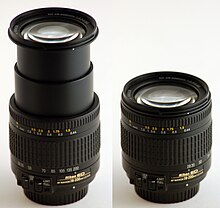
Back عدسة متغيرة البعد البؤري Arabic Вариообектив Bulgarian Zoom Catalan Zoom Czech Zoomobjektiv Danish Zoomobjektiv German Φακός Ζουμ Greek Zomo Esperanto Zum Spanish Zoom Basque
This article needs additional citations for verification. (September 2012) |

A zoom lens is a system of camera lens elements for which the focal length (and thus angle of view) can be varied, as opposed to a fixed-focal-length (FFL) lens (prime lens).
A true zoom lens or optical zoom lens is a type of parfocal lens, one that maintains focus when its focal length changes.[1] Most consumer zoom lenses do not maintain perfect focus, but are still nearly parfocal. Most camera phones that are advertised as having optical zoom actually use a few cameras of different but fixed focal length, combined with digital zoom to make a hybrid system.

The convenience of variable focal length comes at the cost of complexity – and some compromises on image quality, weight, dimensions, aperture, autofocus performance, and cost. For example, all zoom lenses suffer from at least slight, if not considerable, loss of image resolution at their maximum aperture, especially at the extremes of their focal length range. This effect is evident in the corners of the image, when displayed in a large format or high resolution. The greater the range of focal length a zoom lens offers, the more exaggerated these compromises must become.[2]
- ^ Cavanagh, Roger (2003-05-29). "Parfrocal Lenses". Archived from the original on 2007-10-07. Retrieved 2007-11-18.
- ^ "Tamron 18-270mm f/3.5-6.3 Di II VC LD Lens Review". Archived from the original on January 16, 2013. Retrieved March 20, 2013.